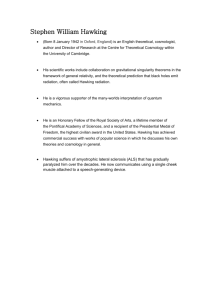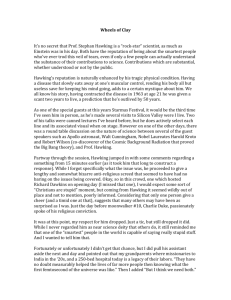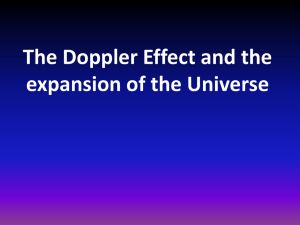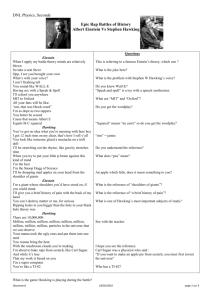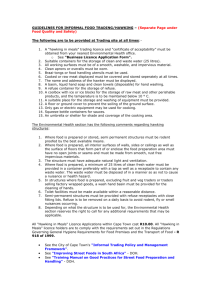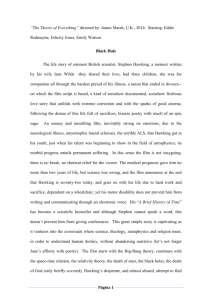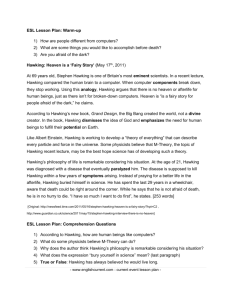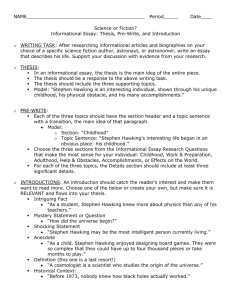He has been proclaimed
advertisement
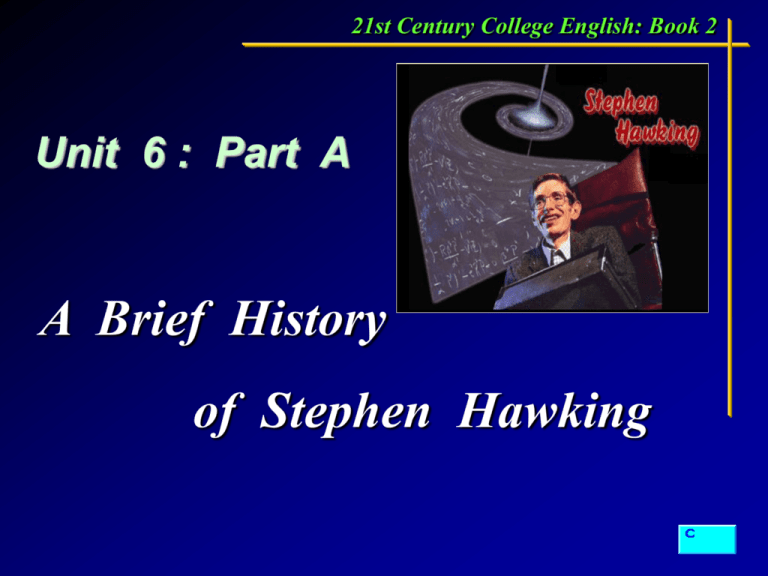
21st Century College English: Book 2 Unit 6 : Part A A Brief History of Stephen Hawking Unit 6: Part A • Pre-reading Activities • Intensive Study • Exercises • Assignment Pre-reading Activities • Pre-listening • Warm-up Questions Pre-reading Activities: Listening First Listening: Before you listen to the tape, have a quick look at the paragraph on p.160. It’s similar to what you’ll hear on the tape, but there are some differences. As you listen the first time, try to find the sections of the paragraph that are different from what you hear on the tape. Don’t worry about yet what the exact differences are – just underline where they appear. Pre-reading Activities: Listening Second Listening: Now underline the differences. Check-up Pre-reading Activities: Listening The differences you should underline are: Stephen Hawking, the world-famous scientist and author, lost his ability to speak in 1985. Already confined to a wheelchair, unable to move more than a few muscles, he lost his voice and this meant he could communicate only by raising his eyebrows. Then an American computer programmer came to Hawking’s rescue by designing a vocalizing computer specially for him. With its help, Hawking can construct sentences at a speed of about 15 words per minute, by selecting words from his computer screen and then clicking on a device that vocalizes the sentences for him. Hawking jokes about the computer: “The only trouble is that it gives me an American accent.” Script Pre-reading Activities: Listening Steven Hawking, the well-known scientist and author, lost his ability to speak in 1983. Already confined to a wheelchair, unable to move more than a few muscles, he lost his voice and this left him able to communicate only by raising his fingers. Then an Australian computer programmer came to Hawking’s rescue by designing a vocalizing computer specially for him. With its help, Hawking can construct sentences at a speed of about 50 words per minute, by selecting words from a computer screen and then clicking a device that says the sentences for him. Hawking likes the computer, saying: “The only trouble is that it gives me an Australian accent.” Pre-reading Activities: Warm-up Questions What else do you know about Stephen Hawking and his book “A Brief History of Time”? Why is he called “the smartest man in the world”? Intensive Study Intensive Study • Difficult sentences • Key words, phrases & usages • Comprehension exercises Intensive Study A Brief History of Stephen Hawking By Michael White & John Gribbin Intensive Study 1 He has been proclaimed “the finest mind alive”, “the greatest genius of the late 20th century”, and “Einstein’s heir”. Known to millions, far and wide, for his book A Brief History of Time, Stephen Hawking is a star scientist in more ways than one. His gift for revealing the mysteries of the universe in a style that nonscientists can enjoy made Hawking an instant celebrity and his book a bestseller in both Britain and America. It has earned a place in the Guinness Book of Records for spending 184 weeks in The Sunday Times “top-ten” lists, and has sold more than five million copies worldwide — virtually unheard-of success for a science book. Intensive Study 2 How did all this happen? How has a man who is almost completely paralysed and unable to speak except through a computer overcome these incredible obstacles and achieved far more than most people ever dream of? 3 Stephen William Hawking was a healthy baby, born to intellectual, eccentric parents. His father Frank, a doctor specializing in tropical diseases, and his mother Isobel, a doctor’s daughter, lived in a big old house full of books. Carpets and furniture stayed in use until they fell apart; the wallpaper hung peeling from old age. The family car was a London taxi, bought for £50. Intensive Study 4 Hawking has always been fascinated by his birth date: January 8, 1942. It was the 300th anniversary of the death of Galileo, the Italian mathematician and astronomer who revolutionised astronomy by maintaining that the Sun is the centre of the Solar System — not the Earth, as ancient astronomers believed. 5 “Galileo”, says Hawking, “was the first scientist to start using his eyes, both figuratively and literally. In a sense, he was responsible for the age of science we now enjoy.” Intensive Study 6 Hawking attended St. Albans School, a private school noted for its high academic standards. He was part of a small elite group, the brightest of the bright students. They hung around together, listened to classical music and read only such “smart” authors as Aldous Huxley and Hawking’s hero, Bertrand Russell, at once an intellectual giant and liberal activist. 7 Hawking spent very little time on maths homework, yet got full marks. A friend recalls: “While I would be struggling away with a complicated problem, he just knew the answer. He didn’t have to think about it.” Intensive Study 8 This instinctive insight also impressed his teachers. One of Hawking’s science teachers, for example, recalls the time he posed the question: “Does a cup of hot tea reach a drinkable temperature more quickly if you put the milk in first, or add the milk after pouring?” While the rest of the class struggled over how to even begin approaching the problem, Hawking almost instantly announced the correct answer: “Add the milk after pouring, of course.” (The hotter the tea initially, the faster it will cool.) Another teacher relates how Hawking and his friends built a simple computer – and this was in 1958, a time when only large research centres had any computers at all. Intensive Study 9 Hawking the schoolboy was a typical grind, underweight and awkward and peering through eyeglasses. His grey uniform always looked a mess and he spoke rather unclearly, having inherited a slight lisp from his father. This had nothing to do with early signs of illness; he was just that sort of kid – a figure of classroom fun, respected by his friends, avoided by most. Intensive Study 10 Hawking went on to study at Oxford, winning a scholarship to read Natural Science, a course which combines mathematics, physics and astronomy, at University College. He found much of the work easy and averaged only one hour’s work a day. Once, when his tutor set some physics problems from a textbook, Hawking didn’t even bother to do them. Asked why, he spent 20 minutes pointing out errors in the book. His main enthusiasm was the Boat Club. Many times he returned to shore with bits of the boat knocked off, having tried to guide his crew through an impossibly narrow gap. His rowing trainer suspects, “Half the time, he was sitting in the stern with his head in the stars, working out mathematical formulae.” Intensive Study 11 Oxford has always had its share of eccentric students, so Hawking fit right in. But then, when he was 21, he was told that he had ALS — a progressive and incurable nerve disease. The doctors predicted that he had only a few years to live. 12 “Before my condition was diagnosed, I was very bored with life,” Hawking says today, speaking from his wheelchair through a computerized voice synthesizer. The doctors’ grim prognosis made him determined to get the most from a life he had previously taken for granted. Intensive Study 13 “But I didn’t die,” Hawking notes dryly. Instead, as his physical condition worsened, Hawking’s reputation in scientific circles grew, as if to demonstrate the theory of mind over matter. Hawking himself acknowledges his disease as being a crucial factor in focusing his attention on what turned out to be his real strength: theoretical research. Hawking specializes in theoretical cosmology, a branch of science that seeks ultimate answers to big questions: Why has the universe happened, and what are the laws that govern it? His main work has been on black holes and the origin and expansion of the universe. He currently holds the Cambridge University professorship once held by Sir Isaac Newton. Intensive Study 14 The smartest man in the world is not immune to the depression that can accompany severe disabilities. But Hawking says: “I soon realized that the rest of the world won’t want to know you if you’re bitter or angry. You have to be positive if you’re to get much sympathy or help.” He goes on: “Nowadays, muscle power is obsolete. What we need is mind power — and disabled people are as good at that as anyone else.” He has been proclaimed “the finest mind alive” ... alive a. — (predicative) having life; living e.g. Cf. •living The doctors are trying every possible means to keep a. (attributive) e.g.him alive. • It I have no living in my hometown. is reported thatrelatives more than forty people were burned alive in yesterday’s fire. More to learn He has been proclaimed “the finest mind alive” ... Paraphrase — He has been declared the most intelligent man who is ? living today ... Known to millions, … Past participial phrases can be used as adverbials. e.g. • Stephen Hawking is known to millions, far and wide, for his book “A Brief History of Time”. He is a star scientist in more ways than one. Known to millions, far and wide, for his book A Brief History of Time, Stephen Hawking is a star scientist in more ways than one. More to do Exercises • Structure VIII. Rewrite the following pairs of sentences as single sentences using past participial phrases as adverbials. 《读写教程 VIII, p. 1. The museum was II》:Ex. originally located in 142 London. It was moved to Hertfordshire in 1946. Originally located in London, the museum was moved to Hertfordshire in 1946. 2. The manager was asked what his plan was for the coming year. He promised to further develop the domestic market. Asked what his plan was for the coming year, the manager promised to further develop the domestic market. Exercises • Structure VIII. Rewrite the following pairs of sentences as single sentences using past participial phrases as adverbials. 3. This symphony was composed in 1878. It’s based on a classical Chinese love story. Composed in 1878, this symphony is based on a classical Chinese love story. 4. Many modern museum exhibits are designed for visitors to touch or play with. They are at once entertaining and educational. Designed for visitors to touch or play with, many modern museum exhibits are at once entertaining and educational. Exercises • Structure VIII. Rewrite the following pairs of sentences as single sentences using past participial phrases as adverbials. 5. Science is aided by technology. It helps mankind to gain increasing control over the environment. Aided by technology, science helps mankind to gain increasing control over the environment. far and wide — everywhere; from or over a large area e.g. • She looked far and wide for the missing diamond ring. • Since he retired, he has traveled far and wide. His gift for … and his book a bestseller in both Britain and America. bestseller n. — anything, especially a book, that has a large sale. Translate e.g. • 《星际大战之三》成了2002的畅销书之一。 The writer’s first novel was a best-seller. •KeyJohn read a best-seller while riding the bus. “Star War III” turned out to be one of the bestsellers in the year 2002. More to learn His gift for … and his book a bestseller in both Britain and America. — His ability to explain the complexities of the universe in a way that the average non-professional readers can understand and appreciate soon made him well known and his book best-selling in both Britain and America. earn vt. — get (sth. that one deserves) because of one’s qualities; deserve e.g. •Translate She earned the promotion from a salesgirl to a sales 他已在历史上赢得了一席之地。 manager. •KeyAfter that, Sharon earned a reputation for honesty. He has earned his place in history. Text-related information Guinness Book of Records 《吉尼斯世界纪录大全》 In 1955, Norris and his twin brother Ross edited the first Guinness Book of World Records. The book was first designed to record the then extremes in, on and beyond the Earth — notably in human performance and of the natural world. The name “Guinness” derives from the Guinness Brewery in Dublin, which was Ireland’s largest company. It is in London now. The book is now published worldwide in 23 different languages. Text-related information The Sunday Times 《星期日泰晤士报》 The Sunday Times is an influential Sunday newspaper published in London, England. It is known around the world for the quality of its reporting and editing and for its coverage of British politics and the arts. The daily Founded in 1822 as a nationally circulated paper with an independent editorial policy, Sunday Times reflects the dignified, carefully written, and well-edited character of its counterpart The Times. virtually ad. — almost; very nearly Notice: You can use virtually to refer to something that is almost or nearly true and that can be regarded as true for most purposes. e.g. • It’s virtually impossible to tell the imitation from the real thing. • The job was virtually completed by the end of the week. More to learn virtually ad. — almost; very nearly Cf. virtual a. —almost what is stated; in fact though not officially Virtual reality is a set of images and sounds produced by a computer which seem to represent a place or situation in which a person experiencing it can take part, and a virtual business is one that exists in cyberspace. paralyse/paralyze vt. — make (sb. ) lose the ability to move part or all of his body, or to feel anything in it Notice: e.g. that people, or organizations are • You He can was say paralysed from places the neck down in a road paralysed accident.by something when it makes them unable to or function properly. • act A stroke paralyzed half his face. e.g. Translate 电力故障使整个城市陷于瘫痪。 • The strike paralysed the transport network. •Key The whole system was paralysed when the main Electricity failure paralyzed the whole city. computer broke down. dream of — wish, fantasize, imagine You dream of doing something or of something happening, when you very much want it to come about. e.g. • He dreamed of winning the world tennis championship one day. • Stephanie often dreams of long sea journeys. specialize in — concentrate one’s studies, interests, etc. on (a particular field, etc.) e.g. Fill in the blank • They Prof.went White in oriental history. to aspecializes _____ (意大利风味餐馆) . • He specialized first in painting birds and later in Keywriting about them. restaurant that specializes in Italian food Carpets and furniture stayed in use until they fell apart; the wallpaper hung peeling from old age. fall apart — break into pieces; break up e.g. • My bicycle is falling apart. • Their marriage finally fell apart. More to learn Carpets and furniture stayed in use until they fell apart; the wallpaper hung peeling from old age. Cf. peel vi. — a covering) come off in strips or small pieces peel (ofn. vt. e.g. — the (off)outer remove covering the outer of fruits covering and from vegetables (a fruit, • After the sunburn, my husband’s skin peeled. vegetable, etc.) e.g. e.g. • orange peel • Mother wanted you to peel some potatoes for salad. • onion peel Carpets and furniture stayed in use until they fell apart; the wallpaper hung peeling from old age. The family car was a London taxi, bought for £50. — Carpets and furniture would not be replaced by new ones until they broke; the wallpaper came off and hung for old age. The family car was a second-hand car bought for £50 from a London taxi company. The description of Hawking’s parents’ house suggests their “eccentric” behaviors in other people’s eyes and, on the other hand, their thrift in life: they would rather bury themselves in a roomful of books than have any comforts in their house. Text-related information Galileo (1564 - 1642) Italian astronomer and physicist. The first to use a telescope to study the stars (1610), he was an outspoken advocate of Copernicus’s theory that the sun forms the center of the universe, which led to his persecution and imprisonment by the Inquisition (1633). … start using his eyes, both figuratively and literally figuratively ad. — 比喻地;借喻地 When someone is speaking figuratively, he is using a word or expression with a more abstract or imaginative meaning than its usual one. e.g. • Figuratively speaking, a number of people still live in the eighteenth century. • When I said I killed him, I was using the word “kill” figuratively. More to learn … start using his eyes, both figuratively and literally literally ad. ad. 2. really 1. exactly, according to the most basic and simple meaning of a e.g. word •e.g. There are literally thousands of “interest groups” on • the TheInternet. book is translated too literally. •• Don’t takebegged everything he says I literally him for help.literally; he likes to exaggerate. More to learn … start using his eyes, both figuratively and literally “Figuratively” and “literally” are often used to describe the meanings of words. In the case of “eye”, literally it means an organ of sight, as in “He closed his left eye and opened his right eye”, while figuratively it means the mind’s eye or observation, as in “To her expert eye, the painting was terrible.” In a sense, he was responsible for the age of science we now enjoy. in a sense — to a certain extent but not entirely e.g. • You are right in a sense, but you don’t know all the facts. • We are, in a sense, being deceitful if we tell them so. More to learn In a sense, he was responsible for the age of science we now enjoy. be responsible for — be the cause of e.g. • The bad weather was responsible for the crop failure. • Who is responsible for the damage? Text-related information Aldous Huxley (1894 - 1963) Aldous Huxley was an English novelist, essayist, critic and poet.During the 1920s and 1930s he lived in Italy and France, and there wrote many of his best fictions, notably Brave New World (1932) and Eyeless in Gaza (1936). Disillusioned with Europe he left for California in 1937, in search of new spiritual direction. He also wrote on science, philosophy, and social criticism. His works, often pessimistic, combine satire and earnestness, brutality and humanity,and shed light on unexplored territory. Text-related information Bertrand Russell (1872 - 1970) Bertrand Russell was a British philosopher, mathematician, and reformer, whose emphasis on logical analysis influenced the course of 20th-century philosophy. He remained constant in his admiration of physics and his belief that science provides the best understanding of all that exists. He was widely known to the general public through campaigns and writings in favor of progressive views in politics, morals, education, and religion. Among his many books are Principles of Mathematics (1903), The Analysis of Matter (1927), Education and The Social Order (1930). He was awarded the Noble Prize for Literature in 1950. at once an intellectual giant and liberal activist at once — at the same time e.g. • All three boys spoke at once. • The book is at once instructive and amusing. • When there’s more than one conversation going on at once, you can’t hear anything. More to learn at once an intellectual giant and liberal activist intellectual a. An is one who has developed his Cf. intellectual intelligent person a. — having orisshowing power of theand mind; needing or in brain and highly educated, is interested — having or showing understanding; able to learn and using power of the mind subjects know that exercise the mind, while an intelligent person has the power of learning or understanding but e.g. e.g. may not know much. •• He’s quite but animals. he’s not what you should Dolphins arebright intelligent describe as intellectual. • Scientists believe that there are intelligent life existing • Thinking is solar an intellectual beyond our system. process. struggle away with — try very hard to do (sth., though it is very hard) e.g. • He struggled away with calculus but eventually understood it. • For years, the scientist struggled away with the establishment to get his theories accepted. More to learn away ad. — all the time; continuously e.g. • She worked away at her job. • The young people chatted away like old friends. Hawking the schoolboy was ... — As a schoolboy Hawking was ... “Hawking the schoolboy”, the reverse of the more common form, the schoolboy Hawking, is a case of restrictive apposition of noun phrases. The appositive preceded by “the” is a general word restricted in meaning by the proper name. e.g. • Robinson the singer (= the singer Robinson) • Paul Jones the critic (= the critic Paul Jones) More to learn Hawking the schoolboy was ... — As a schoolboy Hawking was ... A noun or a noun phrase can be added to another noun or pronoun as further explanation, or modifier, which is called apposition. An appositive is usually placed after the preceding noun, but sometimes in front of a noun or a pronoun for emphasis. e.g. • A public figure, the actress’s private life is always the talk of the town. • I was even more alarmed when I saw who stepped from the car: the wife of Sir John Lavery, the celebrated painter who lived nearby. More to do Exercises • Structure VIII. Rewrite the following sentences. 1. Stephen Hawking is a star scientist in more ways than one. He has achieved far more than most people ever dream of. 《读写教程 II》:Ex. VIII, p. 142 A star scientist in more ways than one, Stephen Hawking has achieved far more than most people ever dream of. 2. Galileo was an Italian mathematician and astronomer. He was the first scientist to start using his eyes, both literally and figuratively. An Italian mathematician and astronomer, Galileo was the first scientist to start using his eyes, both literally and figuratively. Exercises • Structure VIII. Rewrite the following sentences. 3. Hawking was a figure of classroom fun. He spoke with a slight lisp inherited from his father. A figure of classroom fun, Hawking spoke with a slight lisp inherited from his father. 4. The Poetry Society is a group of some forty students. It holds regular meetings where the members recite their poems. A group of some forty students, the Poetry Society holds regular meetings where the members recite their poems. Exercises • Structure VIII. Rewrite the following sentences. 5. Beijing is a fascinating combination of ancient and modern China. It attracts huge numbers of tourists from around the world every year. A fascinating combination of ancient and modern China, Beijing attracts huge numbers of tourists from around the world every year. have something/nothing/anything/a lot/a little to do with — have some/ no/ any/ a lot/ a little relation or connection with e.g. Translate • His job has nothing to do with telephones. 听仔细了,我说的和你有很大关系。 •KeyAbstract art has little to do with everyday experience. Listen carefully, what I have said has a lot to do with you. bother to do sth. — trouble oneself to do sth. Ife.g. you do not bother to do something (usu. with a negative), youyou do not do to it because would too to • How are going learn if ityou don’ttake bother much effort, or because it is unnecessary. listen? • Unfortunately he didn’t bother to check the exact wording of the contract before he signed it. knock off — cause (sth.) to fall from a place e.g. • Just when I had put the glass safely down on the table, the cat jumped up and knocked it off. • A snowball knocked his hat off. • The blow knocked him off his feet. … with his head in the stars, working out mathematical formulae work out — find an answer to (sth.); solve (sth.) e.g. Translation • 我们一直期望能找到一个和平的方案来解决冲突。 Can you work out this math problem for me? • No one can work out how the fire started. Key We are always hoping that a peaceful solution can be worked out to solve the conflict. More to learn … with his head in the stars, working out mathematical formulae — with his thoughts far, far away thinking about solutions to mathematical problems Oxford has always had its share of eccentric students, so Hawking fit right in. have one’s share of sth. — have part of sth.; have the amount that is fair for sb. e.g. • I’ve certainly had my share of problems. • You’ve had more than your share of that ice cream. More to learn Oxford has always had its share of eccentric students, so Hawking fit right in. fit in — be (precisely) suitable (to) e.g. • It’s no surprise she is leaving the course — she never really fits in. • They are looking for someone young to join the team, someone who fits in. More to learn Oxford has always had its share of eccentric students, so Hawking fit right in. Paraphrase — Just like many other universities, Oxford also has ? had some smart students who behaved in a strange way, so Hawking felt as if he belonged exactly to them. Text-related information Amyotrophic Lateral Sclerosis (ALS) It’s also known as Lou Gehrig’s Disease is a progressive, fatal disease of the motor neurons (nerve cells) that control the skeletal muscles of the body. The disease characteristically produces a wasting away of the muscles that have lost their nerve supply, resulting in weakening and paralysis. There are also signs of spasticity, or stiffness, of the muscles and exaggerated reflexes. Eventually, ALS results in total paralysis and respiratory failure. The senses and intellect are not affected. take (sth.) for granted — be so familiar with (sth.) that one no longer appreciates its full value; treat (sth.) as unimportant e.g. Translation • 不要把一切都看成是想当然。 He just takes it for granted that the house is tidy. • Most young people take the washing machine for Key granted because they’ve never lived without it. Don’t take everything for granted. mind over matter — (sometimes humor) control of events or material objects by the power of the mind e.g. • My grandfather firmly believed that he had cured his own cancer through mind over matter. • Keeping to a strict diet is a question of mind over matter. turn out to be — happen to be in the end e.g. • That guy we met the other day turned out to be Andy’s second cousin. • His statement turned out to be false. Text-related information Black Hole Black hole is a cosmic body of extremely intense gravity from which nothing, not even light, can escape. A black hole can be formed by the death of a massive star. When such a star has exhausted its internal thermonuclear fuels at the end of its life, it becomes unstable and gravitationally collapses inward upon itself. The existence of another kind of nonstellar black hole has been proposed by the British astrophysicist Stephen Hawking. According to Hawking’s theory, numerous tiny black holes might have been created during the big bang, a state of extremely high temperatures and density in which the universe is thought to have originated roughly 10 billion years ago. Text-related information Sir Isaac Newton Sir Isaac Newton, English mathematician and physicist, considered one of the greatest scientists in history, made important contributions to many fields of science. His discoveries and theories laid the foundation for much of the progress in science since his time. Newton was one of the inventors of the branch of mathematics called calculus. He also solved the mysteries of light and optics, formulated the three laws of motion, and derived from them the law of universal gravitation. be immune to — not responsive to or affected by (diseases, criticism, bad treatment, etc.) e.g. • They’re always so rude that I’ve already become immune to it. • My uncle seems to be immune to colds — he just never gets them. Exercises • Comprehension Ex. II • Vocabulary Ex. III ~ VII • Listening & Discussion Part 3.3 Comprehension II. Answer the following questions. 《读写教程II》:Ex. 1. Why do the authors call HawkingII, “a p. star140 scientist in more ways than one”? Key: Because he is a star in the sense of celebrity and in the sense of that his expertise is related to astronomy. Relevant to: Para. 1 Comprehension II. Answer the following questions. 2. In what way is Hawking disabled? Key: He is paralysed except for a few muscles, and he lost his ability to use his voice. Relevant to: Para. 2 Comprehension II. Answer the following questions. 3. Why do the authors mention the Hawking family’s carpets, wallpaper and car? Key: These are the examples of the family’s eccentricity. Relevant to: Para. 3 Comprehension II. Answer the following questions. 4. What does Hawking mean by saying that “Galileo was the first scientist to start using his eyes, both figuratively and literally”? Key: He means that he regards Galileo as the first scientist to closely observe the world and to base his ideas about science on observation. Relevant to: Para. 5 Comprehension II. Answer the following questions. 5. What sort of student was Hawking as a schoolboy? Key: He was very gifted without having to work hard, and he hung around with an “elite group” of intelligent students. Relevant to: Para. 5.6.7 Comprehension II. Answer the following questions. 6. Why do the authors mention Hawking’s quick answer to the question about cooling tea? Key: It seems to be meant as an example of his quick and insightful mind – but to me it sounds as if Hawking just happened to know the answer to this particular “puzzle” (so do I, now!). Relevant to: Para. 8 Comprehension II. Answer the following questions. 7. What made him “a figure of fun”? Key: His physical awkwardness, his messy uniform and his speech impediment. Relevant to: Para. 9 Comprehension II. Answer the following questions. 8. Why do the authors mention Hawking’s poor boating skills? Key: It’s an example of Hawking’s eccentricity. Relevant to: Para. 10 Comprehension II. Answer the following questions. 9. How did the diagnosis of ALS affect Hawking’s feelings about life? Key: He gained appreciation for and interest in life. Relevant to: Para. 11 Comprehension II. Answer the following questions. 10. What do the authors mean by saying that Hawking’s growing reputation was like a demonstration of “the theory of mind over matter”? Key: They mean that it seemed to show how determination and ambition can help people overcome seemingly impossible obstacles (i.e. Hawking’s severe disabilities). Relevant to: Para. 13 Comprehension II. Answer the following questions. 11. How did his disease contribute to his career? Key: It helped him focus on what his real gift was: theoretical research. Relevant to: Para. 13 Comprehension II. Answer the following questions. 12. What does Hawking mean when he says “muscle power is obsolete”? Key: He means that civilization has evolved to the point that physical disabilities like his don’t mean a person can’t make a meaningful contribution to society. Relevant to: Para. 14 Exercises • Vocabulary Ex. III Ex. IV Ex. V • Word Building Ex. VI Ex. VII Vocabulary III. Fill in the blanks with the words given below. Change the form where necessary. proclaim obstacle paralyse《读写教程 insight eccentric inherit pose II》:Ex. p. 140 predict initially III, gap 1. Stephen Hawking soon proved himself to be a scientist of great _____ and creativity. insight 2. Fear of making mistakes is one of the main _____ to mastering spoken English. obstacles Vocabulary III. Fill in the blanks with the words given below. Change the form where necessary. proclaim obstacle eccentric inherit pose paralyse insight initially gap predict 3. The disease affected his muscles and nervous system and gradually _____ him. paralysed 4. Cloning, a technological breakthrough, _____ some serious ethical (伦理的) problems. poses Vocabulary III. Fill in the blanks with the words given below. Change the form where necessary. proclaim obstacle eccentric inherit pose paralyse insight initially gap predict 5. This book has been _____ a modern masterpiece. proclaimed 6. The storms are _____ to reach the North of the country tomorrow morning. predicted Vocabulary III. Fill in the blanks with the words given below. Change the form where necessary. 7. proclaim obstacle eccentric inherit pose paralyse insight initially gap predict _____, his theories created a lot of controversy in scientific circles, but now they’re widely accepted. Initially 8. The old man lives alone and is rarely visited by his neighbors, who consider him _____. eccentric Vocabulary III. Fill in the blanks with the words given below. Change the form where necessary. proclaim obstacle eccentric inherit pose paralyse insight initially gap predict 9. The government must take some measures to narrow the _____ between the rich and the poor. gap 10. Although he knew he would _____ a great fortune from his father, Richard was determined to earn his own living. inherit Vocabulary IV. Rescue these notes! This time our underachieving student has made some notes about Text A, but they’re full of words that are 《读写教程 II》:Ex. IV, p. 171 the opposite of what they should be! Replace the underlined words with their opposites from the text, and then rewrite the notes as complete sentences. Vocabulary IV. Rescue these notes! 1. Hawking / proclaimed / an underachiever / Einstein’s ancestor a genius heir Rewrite: Hawking has been proclaimed a genius and Einstein’s heir. Vocabulary IV. Rescue these notes! 2. Father / doctor generalizing / polar diseases specialize in tropical Rewrite: His father was a doctor specializing in tropical diseases. Vocabulary IV. Rescue these notes! 3. Modern astronomers maintained / Earth / centre / Lunar (月球的) System ancient solar Rewrite: Ancient astronomers maintained that the Earth was the centre of the Solar System. Vocabulary IV. Rescue these notes! 4. Hawking / part / ordinary group / bright students / popular music elite classical Rewrite: Hawking was part of an elite group of bright students who listened to classical music. Vocabulary IV. Rescue these notes! 5. He ignores his disease / crucial factor / attention on practical research. acknowledge theoretical Rewrite: He acknowledges that his disease was a crucial factor in focusing his attention on theoretical research. Vocabulary V. Rewrite the sentences below using phrases based on the words in parentheses. Be sure to make any other necessary changes as well. 《读写教程 II 》:Ex. V, p. 141 1. Big industries that are the source of a lot of pollution pay special taxes that finance environmental clean-up projects. (responsible) Big industries that are responsible for a lot of pollution pay special taxes that finance environmental clean-up projects. Vocabulary V. Rewrite the sentences below using phrases based on the words in parentheses. Be sure to make any other necessary changes as well. 2. We bought these chairs only last year and they’re collapsing already. (fall) We bought these chairs only last year and they’re falling apart already. Vocabulary V. Rewrite the sentences below using phrases based on the words in parentheses. Be sure to make any other necessary changes as well. 3. Each of us has to solve the problems posed by life in our own way. (work) Each of us has to work out the problems posed by life in our own way. Vocabulary V. Rewrite the sentences below using phrases based on the words in parentheses. Be sure to make any other necessary changes as well. 4. Haven’t your parents ever said anything about your spending time in the company of such eccentric things. (hang) Haven’t your parents ever said anything about your hanging around with such eccentric things. Vocabulary V. Rewrite the sentences below using phrases based on the words in parentheses. Be sure to make any other necessary changes as well. 5. Just as Jane put the glass on the table, the cat jumped up and caused it to fall. (knock) Just as Jane put the glass on the table, the cat jumped up and knocked it off. Vocabulary V. Rewrite the sentences below using phrases based on the words in parentheses. Be sure to make any other necessary changes as well. 6. Fascinated by the stars and planets, the boy wished to become a professional astronomer someday. (dream) Fascinated by the stars and planets, the boy dreamed of becoming a professional astronomer someday. Vocabulary V. Rewrite the sentences below using phrases based on the words in parentheses. Be sure to make any other necessary changes as well. 7. Many educators say that an ability to perform well on tests is completely unrelated to true intelligence. (nothing) Many educators say that an ability to perform well on tests has nothing to do with true intelligence. Vocabulary V. Rewrite the sentences below using phrases based on the words in parentheses. Be sure to make any other necessary changes as well. 8. Alfred was a great philosopher and a talented musician as well. (once) Alfred was at once a great philosopher and a talented musician as well. Vocabulary V. Rewrite the sentences below using phrases based on the words in parentheses. Be sure to make any other necessary changes as well. 9. Plenty of people who had trouble in school later proved to be creative geniuses. (turn) Plenty of people who had trouble in school later turned out to be creative geniuses. Vocabulary V. Rewrite the sentences below using phrases based on the words in parentheses. Be sure to make any other necessary changes as well. 10. Of course you have trouble learning if you never take the trouble to look up new words in the dictionary. (bother) Of course you have trouble learning if you never bother to look up new words in the dictionary. Word Building VI. Complete the following table and translate the newlyformed words into Chinese. 《读写教程 II》:Ex. VI, p. 141 Word Building n. (subject) physics 1. anthropology archaeology astronomy biology 5. chemistry 7. cosmology mathematics philosophy 13. psychology sociology a. physical Anthropological Archaeological Astronomical 4. biological Chemical Cosmological 9. mathematical 11. philosophical 14. psychological 15. sociological n. (person) physicist anthropologist 2. archaeologist 3. astronomer biologist 6. chemist 8. cosmologist 10. mathematician 12. philosopher psychologist 16. sociologist Vocabulary VII. The prefix tele- is added to some nouns with the meaning of over a long distance. Fill in the words that are defined for you, or complete the definitions of the words that are given to you. Models: telescope: 《读写教程 II》:Ex. VII, p. 142 an instrument used for making distant things appear larger and nearer telephone: an instrument used for sending sounds over a long distance by electrical means. Vocabulary VII. The prefix tele- is added to some nouns with the meaning of over a long distance. Fill in the words that are defined for you, or complete the definitions of the words that are given to you. telegram 1. •____________: a message sent over a long distance by using electrical or radio signals. television 2. •____________: a message sent over a long distance by using electrical or radio signals. Vocabulary VII. The prefix tele- is added to some nouns with the meaning of over a long distance. Fill in the words that are defined for you, or complete the definitions of the words that are given to you. 3. telecommunications: the science and technology of ____ by using electronic equipment. • communicating over long distances Vocabulary VII. The prefix tele- is added to some nouns with the meaning of over a long distance. Fill in the words that are defined for you, or complete the definitions of the words that are given to you. 4. telemedicine: the science that makes it possible to _____ through computer networks • treat a patient a long distance away or provide medical treatment from a distance Vocabulary VII. The prefix tele- is added to some nouns with the meaning of over a long distance. Fill in the words that are defined for you, or complete the definitions of the words that are given to you. 5. teletext: a service providing _____ on customers’ television screens • information in the form of text Listening & Speaking Directions: Listen carefully to the following text-related passage and fill in the blanks with missing information. 《听说教程 II》:Part 3.3, p. 86 Check-up Listening & Speaking Announcer: Good evening ladies and gentlemen, and welcome to “Just Numbers”, our weekly collection of odd facts. Our question for tonight is: What does “the man on the street” really think of science and scientists? In order to find out, New Scientist magazine conducted a survey of 1,901 average British citizens, asking for their views on various aspects of science and technology. The results of the survey were fascinating — and at times alarming. Listening & Speaking The first question in the survey was; What do you consider the greatest scientific achievement since World War II? The don’t know most frequent response — 36% — was (1) “_____________”. (2) Space exploration came in a poor second, at (3) ____%, 17 _______________ and (4) Computers 9 __________ were in third place, with a stunning (5) _____%. The next question New Scientist posed in its survey was: Name three famous scientists, living or dead. And who do you think turned out to be the most famous and popular scientist of all time, mentioned by a full 47% of the respondents to the Albert Einstein No — he came in second, with (7) survey? (6) ______________? 28 Sir Isaac Newton _____%. (8) ________________? He was third — only (9) 13 Newton First place went _______% of the public named (10) _________. Don’t know to — have you guessed? — (11) “_____________”. Listening & Speaking Although the public is clearly not very impressed with individual scientists and specific scientific achievements, we’re glad to report that the survey did reveal a few positive opinions 11 about science. Only (12) _____% of the people questioned said that they feel science does more harm than good. And a full (13) 19 _____% proclaimed that they have “a great deal of confidence” in science and the scientific community. If any scientists are listening, don’t worry. The survey provided some insight into how to improve science’s public image. The statistics showed that in general, people who have studied more science in school are stronger supporters of science. So as usual, education seems to be the key to popularity. That’s it for tonight, ladies and gentlemen — and thanks for listening to “Just Numbers”. Script Listening & Speaking: Script Although the public is clearly not very impressed with The first question in the What achievements, do you consider the individual scientists andsurvey specificwas: scientific we’re greatest scientific since World War II? The most Announcer: glad to report thatachievement the survey did reveal a few positive opinions frequent response — 36% — was questioned “don’t know”. Space about science. Only 11% of the people said that they Good evening ladies and gentlemen, and welcome to “Just exploration came inmore a poor second, atgood. 47%,And and acomputers feel science does harm than full 19% Numbers”, our weekly collection of odd facts. Our question for were in third place, with a stunning 9%. proclaimed that does they “the haveman “a on great of really confidence” in tonight is: What the deal street” think of science the scientific community. The nextand question New Scientist posed in itsout, survey was: Name science and scientists? In order to find New Scientist three famous scientists, living or 1,901 dead. Andworry. who doThe you think magazine conducted a survey of average British citizens, If any scientists are listening , don’t survey turned out totheir beinsight the most andimprove popularof scientist ofand all asking forsome views onfamous various aspects sciencepublic provided into how to science’s time, mentioned by a full of the respondents to the survey. technology. results of 47% the survey fascinating — and at image. TheThe statistics showed that inwere general, people who have Albert Einstein? No — he second, with 28%. Sir Isaac times rather alarming. studied more science in came schoolin are stronger supporters of Newton? — only 13% ofthe thekey public named science. SoHe as was usual,third education seems to be to popularity. Newton. First place went to — have you guessed? — “Don’t That’s it for tonight, ladies and gentlemen — and thanks for know”. listening to “Just Numbers”. Assignment 1. Revision of Text A: • Translation Ex. XI p.143 • Cloze p.143 Ex. XII 2. Preview of Text B: • Ex. XV p. 146
